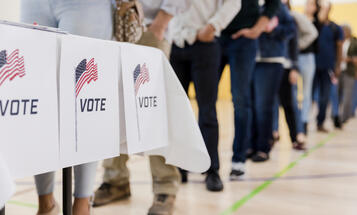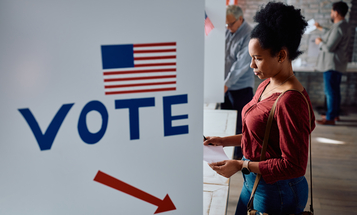
STATEMENT: Progress Made Protecting New Yorkers' Voting Rights
New York, NY — Responding to recent studies showing persistent confusion among elections officials, the New York State Board of Elections has taken important practical steps to protect the voting rights of New Yorkers with felony convictions.
At a training session for hundreds of county officials in Syracuse last week, the New York State Board clarified the law: New Yorkers with felony convictions are eligible to vote unless they are presently in prison or on parole. No special documentation is needed to register. Citizens sentenced to probation never lose the right to vote.
Public interest groups commend the state Board and its deputy counsel, Patricia Murray, for taking immediate steps to educate local election officials, while calling on the New York City Board of Elections and the state legislature to follow suit.
Roughly half of New York's county election boards are confused about who is eligible or improperly ask for special documentation from citizens with criminal convictions before allowing them to register, according to surveys conducted in 2003 and 2005 by the Brennan Center for Justice at NYU School of Law and Demos.
"Thanks to the training session in Syracuse, thousands of eligible New Yorkers will be able to exercise the most basic right of citizenship in the upcoming elections," said Catherine Weiss, a Brennan Center lawyer.
"Unfortunately, this problem disproportionately affects New York City, home to 50 percent of New Yorkers sentenced to prison and 61 percent of people on parole" added Scott Novakowski, policy analyst at Demos. "We're now turning our attention to working with the City's election officials."
New York City is also home to one-third of state residents on probation for a felony conviction, who are eligible voters under state law. Until recently, the city Board of Elections presented misleading information about eligibility and registration for this group on its Web site and automated phone system.
This month, the state Board approved updated, accurate scripts to be used by local officials on Web sites and phone systems.
Advocates at Demos, the Legal Action Center, and the Brennan Center also called on Albany to enact laws that will make it easier for qualified New Yorkers with felony convictions to exercise their right to vote.
"We're talking about people who work, pay taxes, and live alongside other citizens," said Glenn Martin of the Legal Action Center. "At a minimum, they deserve clear and systematic notice when their voting rights are restored."
Addendum:
In Syracuse the state Board of Elections gave county officials this pop quiz:
Who among these NY residents is eligible to vote:
- A person serving 6 months in jail for a misdemeanor conviction?
- A person awaiting trial for a felony in a Connecticut jail?
- A person serving a five-year probation sentence for a felony conviction?
- A person under supervised release following completion of a federal prison sentence for a felony conviction?
- A person living in the community after discharge from parole for a felony conviction?
Each of these people is eligible. County election officials who did not know this before, know it now.
###



